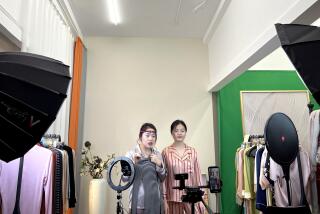Taiwan is Now in Vogue, and Vice Versa
- Share via
TAIPEI — No one influences more hemlines than Vogue magazine. And, with more than half a billion women, no country has more hemlines to influence than China.
So why is the French fashion bible launching its first Chinese-language edition in Taiwan, a gritty but prosperous island of 21 million people that has been estranged from China since 1949?
“Now is the right time for Vogue to be in this market,” Didier Guerin, president of publisher Conde Nast Asia-Pacific, said in Taipei. “Taste has evolved and the desire for quality has been established.”
The communist mainland, by contrast, has yet to reach the economic critical mass needed to sustain what Guerin unabashedly called “the most sophisticated fashion magazine in the world.”
“China is a very interesting country but is a long way away from the prosperity that Taiwan is experiencing,” Guerin said. “But it’s not far. It’s been going very fast.”
More to the point, China remains closed to magazines seen by conservative ideologues as agents of crass western materialism at a time when the Communist Party vogue is to cultivate a more utopian “spiritual civilization.”
“China’s market is completely closed to foreign publishers,” Guerin said. “We will be very interested to publish our magazine there one day, but only when we are allowed to.
“Things will change in China,” he added hopefully.
In the meantime, Vogue and its men’s style stable-mate GQ are using Taiwan as a staging ground, a place to learn how to run a fashion magazine in a Chinese environment--a pattern seen in many industries eager to crack the promising China market.
Both magazines, being launched by supermodel Linda Evangelista, are latecomers and must compete with Chinese editions of Cosmopolitan, Elle, Marie Claire and dozens of local and Japanese rivals.
A record $2-million launch budget will help, Guerin said, vowing that Conde Nast is in Taiwan for the long haul and would not rush Vogue to its target circulation of 50,000.
“We are not trying to make a quick buck,” the dapper, Sydney, Australia-based Frenchman said from behind pink-framed spectacles.
“We want to establish our magazine in the right way. We are making an enormous amount of investment. We would be prepared to wait several years to break even.”
Conde Nast is privately held and Guerin declined to say how much money Vogue and GQ expected to make.
Target readers for both magazines are what Guerin deftly calls “more mature,” explaining that young men and women already have many magazine choices.
Vogue Taiwan, debuting at a hefty 300-plus pages, is Vogue’s second edition in an Asian language following the launch of a Korean edition two months ago.
Guerin said the key to success in any market was tailoring the magazine to the local culture, and he promised that Vogue Taiwan would be no exception.
“Korean Vogue is very Korean in its focus and our Chinese edition of Vogue will be very Chinese,” he said. “Of course all our editions of Vogue are Vogue but they are very local and follow the local culture.”
“Fashion in the history of China is very important, going all the way back to the Tang dynasty [618-907]. Make-up was started in the Tang dynasty,” he said.
The selection of the western model Evangelista for the first cover was no slight to Vogue’s mostly ethnic-Chinese Taiwanese readers, but simply a concession to scheduling conflicts for the Asian supermodels its editors had considered, he said.
Evangelista wears a Chinese designer’s dress on the cover, he quickly noted.
Guerin said the venerable Vogue was changing with the times and with fashion’s growing importance in Asia.
“Fashion has exploded in a great number of centers. Fifty years ago fashion came from Paris,” he said.
“Taipei is definitely a center of fashion now. Taipei has designers who are very interesting, who are creating some very unique types of clothing. Of course Vogue is going to cover these as well.”
Guerin said his many visits to Taipei, a bustling, crowded, traffic-choked city where many residents have made fortunes and love to flaunt them, convinced him that Vogue would prosper.
“They work very hard and want to play very hard as well,” he said of Taiwan’s swelling middle and upper classes. “They want to enjoy the beauty of life, the beauty of clothes, the pleasure of fashion.
“Vogue is about the pleasure of being a woman.”
More to Read
Sign up for Essential California
The most important California stories and recommendations in your inbox every morning.
You may occasionally receive promotional content from the Los Angeles Times.












